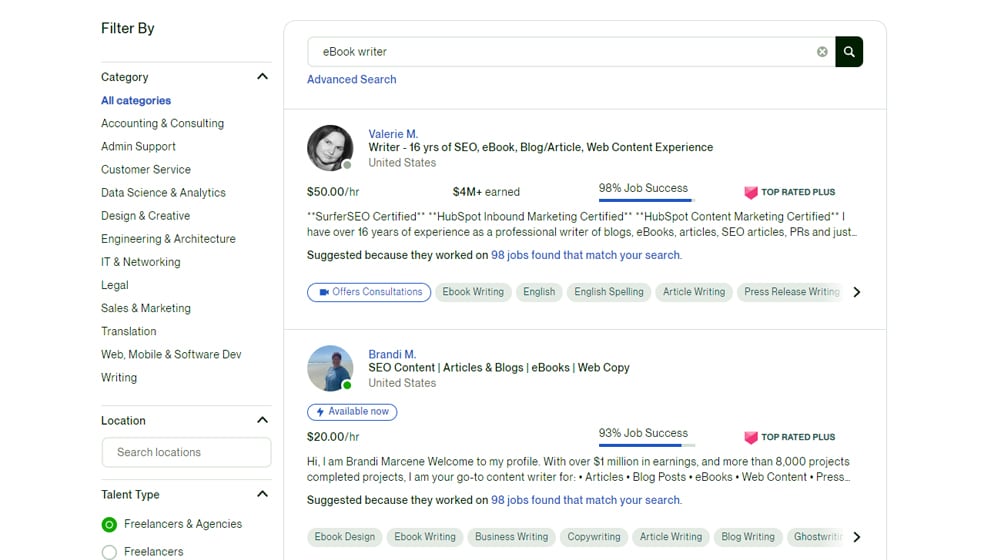Of all the various forms of freelance writing available online, eBooks are perhaps one of the trickiest to hire for. Writing short-form content requires an adept command of vocabulary and skill at combining words in a short space to convey a lot of meaning. Writing mid-form content like website pages and blog posts is a (relatively) easily trainable skill, and the added length provides a lot of flexibility to the writers.
The format of eBooks, though, requires additional attention to elements of a piece that other forms of writing lack. It needs a lot more emphasis on structure and logical flow. It requires consistency, detail, and expertise across the entire project.
 Most importantly, it also requires someone who can work on a single long-form project for weeks (or months, depending on various factors) and maintain deadlines.
Most importantly, it also requires someone who can work on a single long-form project for weeks (or months, depending on various factors) and maintain deadlines.How can you hire a good eBook writer? Read on for our tips and instructions.
The first thing you'll want to do is spend some time pinning down the various details of your project, so you know who to hire, how to hire them, how to work with them, and how to produce a finished product you're happy with.
This involves asking yourself several important questions.
First, what kind of book will this be? Are you looking to produce a work of non-fiction or fiction? Is it marketing copy, self-promotional biography, or storytelling? There are all manner of different kinds of eBooks written in all kinds of genres; billions of them are published on Amazon and many more on other platforms.
Most people don't go into the idea of getting an eBook ghostwritten without at least the seed of an idea. That idea needs to be expanded into your core concept, and you need to think through what you'll need.
Next, ask yourself who your audience will be. Are you writing children's or young adult literature? Are you writing a marketing book to promote yourself or your brand? Are you writing an industry tell-all as a way to drive up sensationalized press? Are you just writing something moderately authoritative to cement yourself as a thought leader? All of these have different kinds of audiences (B2C or B2B, Adults or Children, educational or entertainment, etc.)

Related to this, you'll also want to decide how long the book should be. The shortest eBooks can range around 5,000 to 10,000 words in length. The exception to this is children's books, which can be much shorter but are often filled with illustrations to take up much more room (and budget) in the production.
On the other hand, longer eBooks can be as much as 30,000, 50,000, or even more in word count. This is more the domain of biographies, tell-all reports, or fiction, though, of course, fiction novels can be even longer.
Two data points that may be interesting:
Another decision you'll want to make is how much original insight your writer should produce. Some eBook commissioners will set down a topic and a set of guidelines and don't care what the writer writes as long as it's accurate and authoritative. Others want a ton of their own personal insight, quotes, and thoughts in the piece and need the writer to piece them together. These processes work in different ways, and different writers excel in different forms.
Speaking of the process, you need to understand how a typical eBook commission works. When you're hiring an eBook writer, you want to find one that works with your process.

Generally, it will look something like this:
Speaking of costs, eBooks can be a costly endeavor. Obviously, you don't want to pay up-front for an entire project, but a writer will never commit to writing an entire book without seeing some money. How does it all work?
There are, of course, all kinds of different payment options for eBooks. The most common, though, works like this.
First, you find your writer, which is easier said than done. Then, you hammer out that outline, and you agree on a general price for your eBook. This is usually a price per page (or per word, with the agreement that a "page" is about 200-300 words, as in a traditional manuscript.)
Generally, since there's a lot of commitment and a lot of work up-front, you will pay your writer an advance on the first three chapters of the book. This can vary depending on the intended length of chapters, the length of the book, and so on. Obviously, a 4,000-word eBook is a much different style of project than a 30,000-word eBook will be.
You pay the advance and work with the writer to produce the first three chapters.

At this point, you re-evaluate.
This is your opportunity to decide whether or not the project is worth continuing and lock in things like your tone, style, general approach, outline, and more. If you decide the project isn't worth it and you've paid for the content you had produced, you can part ways amicably. If you decide to continue the project, this is your last chance to make major changes.
Many commissioners reach this point and realize they don't actually have enough substance to write a full eBook and need to either drastically shorten the full piece or cancel it altogether. There's no shame in doing so; you've paid your writer for what they've done, and you have them on hand if you have another project later. Alternatively, you can change the scope of the project into something shorter, something broader, or something else entirely. This is the moment for re-evaluation and adjustment.
From here, assuming your initial outline holds, the rest of the project typically goes on a per-chapter basis. You work with the writer to hammer out a chapter, you pay for the chapter, and this continues until every chapter is written.
At this point, you have the finalization of the book to consider. Is your writer going to do a final editing pass, or do you want to hire an editor to do that? Are you going to hire a graphic designer to add images and graphics to the eBook, or will you do that in-house? Do you want to hire a publication specialist for layout and design?
This brings us to another key point.
When commissioning an eBook, it pays to recognize that there's more to it than just writing. You may need the following:
Thus, you have one significant choice to make. Do you hire all of these people as freelancers (or build a team made of in-house elements and freelancers if you have a few on staff already), or do you hire an agency?

Agencies typically have all of these people on staff already. You get an account rep, and they handle everything between you and the writer, though some agencies give their writers the leeway to interview you directly when they have questions.
Agencies are generally more expensive but less time-consuming than managing a team of freelancers on your own. Of course, an agency known for producing high-quality eBooks is different from freelancers in terms of expectations, processes, contracts, and more.
Both options are perfectly viable. It largely just depends on how much personal time you want to invest in the project. Some clients are too busy to do more than a few basic interviews and are happy to let an agency handle the rest. Others want a more hands-on approach and want to manage details to their satisfaction. Pick the option that works best for you.
If you're looking for an agency, it's easy enough to search for "eBook writing agency" and get plenty of results. Finding specific writers is harder. Some writers don't like long-form content, while others specialize in it.
You generally have two options. You can post a job listing on sites like Indeed or your own careers page and have writers come to you. Often, instead of generalist job boards, you can look on writer-specialist job boards like ProBlogger or my own board.

Or, you can look for writers on writing or freelancer hubs, like Upwork. Both methods can work, though typically, finding and reaching out to writers can work better if you look for people who list both your industry and topic as a specialty and who have written long-form content in the past.
Once you've found a promising writer, either from them pitching you or you pitching them, all that's left is to get to work. Variations of the above process are common, so it's up to you to work out the way you want it all to go.
If you have any questions about the hiring process for eBook writers, feel free to drop us a line, and we'll gladly help you out however we can!